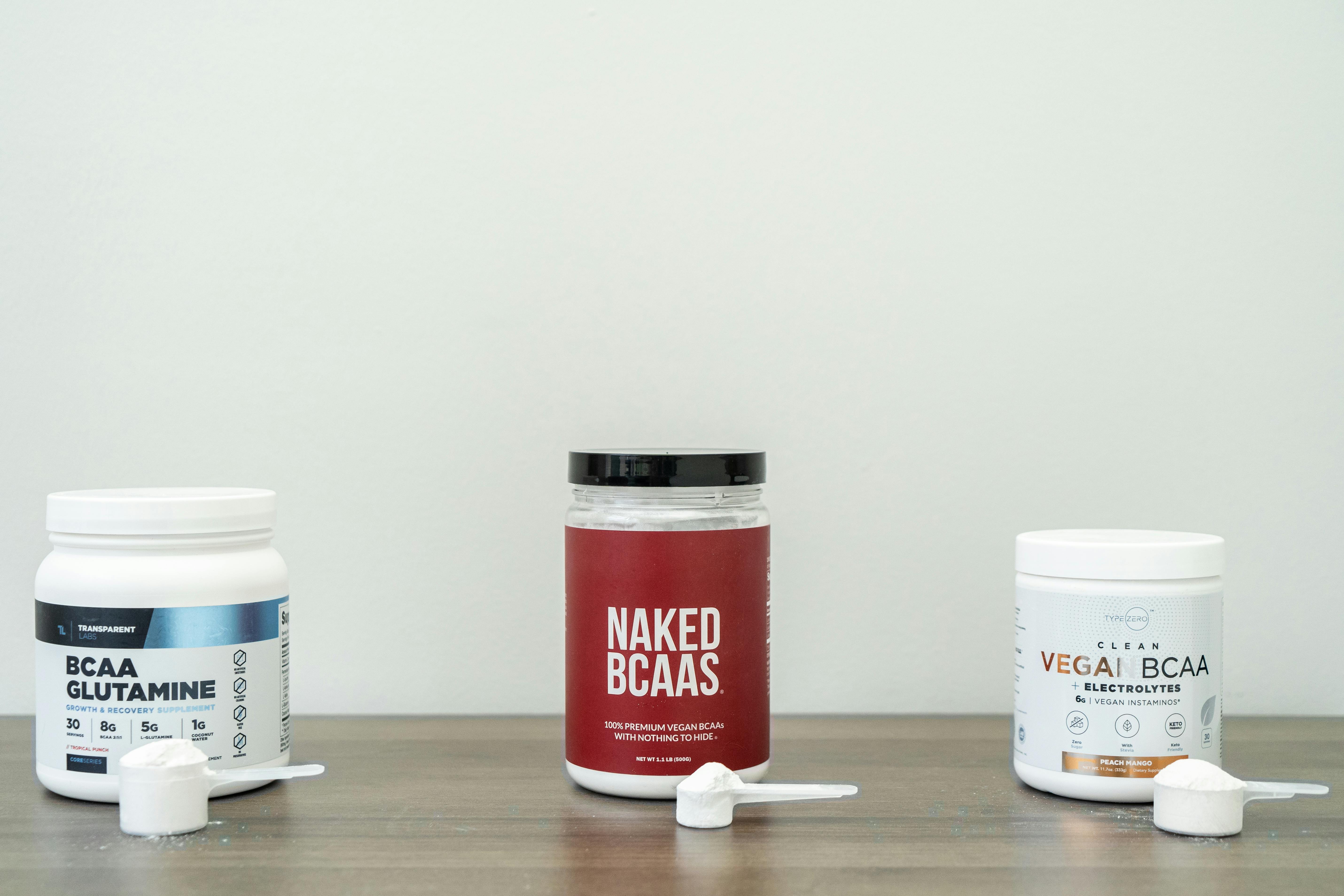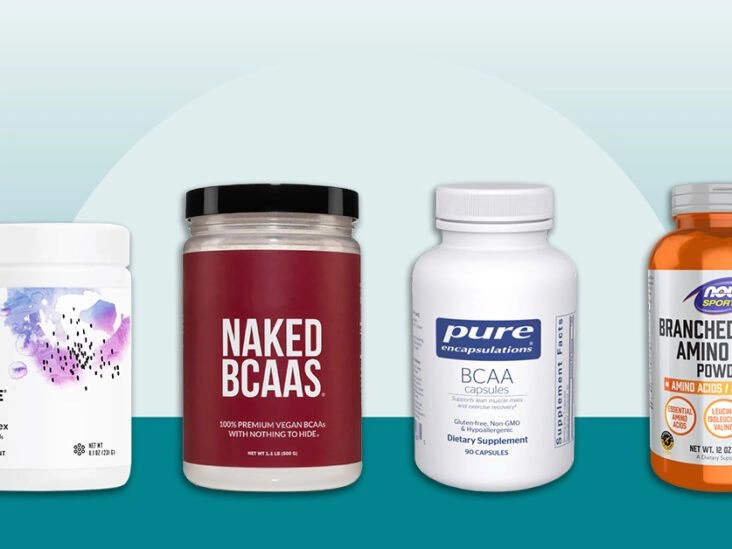A quick look at the best BCAA supplements
- Best overall BCAA supplement: | Skip to review
- Best BCAA supplement with L-glutamine: | Skip to review
- Best pre-workout BCAA powder: | Skip to review
- Best affordable BCAA supplement: | Skip to review
- Best unflavored BCAA supplement: | Skip to review
- Best vegan BCAA supplement: | Skip to review
- Best BCAA capsules: | Skip to review
- Best affordable BCAA capsules: | Skip to review
Branched-chain amino acids (BCAAs) are composed of the essential amino acids leucine, isoleucine, and valine.

BCAAs stand out from other amino acids because they feature a branched side chain and are the only amino acids primarily metabolized in skeletal muscle. They are classified as essential because your body cannot synthesize them and must obtain them from food.
Many athletes and regular gym attendees use BCAAs to potentially boost performance, lessen soreness, and stave off muscle fatigue. Although further research is required, BCAAs may also help people with inadequate protein intake, older adults, and those with liver disorders such as cirrhosis.
BCAAs aren’t essential for everyone, but they could be useful for specific groups, including athletes. If you’re thinking about trying a BCAA product, our nutrition experts selected the eight top options.
Healthline’s picks of the best BCAA supplements
Product comparison
Here’s a quick view of how our selections stack up:
-Price per servingTypeAvailable flavorsLeucineIsoleucine and ValineOther ingredientsSweetenerSafe for sport$1.63powder• lemon• berry1.25 g625 mgEAAssteviayes$2.25powderorange2.5 g1.2 gL-glutaminesteviano$1.79powderorange2 g1 gpeak ATP• xylitol
• monk fruit
• steviayes$0.74powderunflavored2.3 g1.1 g––yes$0.89powderunflavored1.5 g750 mg––no$0.35powder• unflavored
• Cherry Lime
• Strawberry Lemonade2.5 g1.25 g––no$0.62capsulesunflavored600 mg300 mg––no$0.87capsulesunflavorednot disclosed (2.6 g total BCAAs)not disclosed––yes
Note that “safe for sport” refers to products that are NSF Certified for Sport or Informed-Sport certified.
How we chose
With so many options available, choosing the right product can be confusing. The BCAA supplements above were chosen based on the following factors:
- Quality: Supplements made in facilities that follow safety and quality practices and ideally undergo third-party testing for purity and label accuracy
- Ingredients: Products without unnecessary artificial additives, such as synthetic sweeteners, dyes, and flavorings
- Reputation: Brands and items trusted by healthcare professionals, including doctors and registered dietitians
- Vetting: Supplements we reviewed to ensure they meet Healthline’s standards for editorial integrity and health guidance; read more about our vetting process
How to choose the best BCAA supplement
If you’re considering a BCAA supplement, keep a few factors in mind when shopping.
- Quality: Choose supplements from reputable brands that follow recognized safety and quality measures, such as third-party verification and compliance with CGMPs enforced by the FDA.
- Dose: BCAA dosing varies by purpose and body size. Most products deliver between 3 g and 10 g of total BCAAs per serving and may be taken multiple times per day. If you’re unsure about the appropriate dose or schedule, consult a registered dietitian specializing in sports nutrition or a physician if using BCAAs for a medical issue.
- Ingredients: Some BCAA products contain added sugars, gluten, soy, or artificial sweeteners. Check labels if you need to avoid specific substances.
- Form: Think about which format suits you best. Powders can be preferable if you dislike swallowing pills, while capsules are more convenient on the go.
BCAA supplements are generally regarded as safe. Still, consult a healthcare professional before starting any new supplement, particularly if you have an underlying medical condition.
Certain individuals, such as people with disorders that impair BCAA breakdown (for example, maple syrup urine disease), should avoid BCAA supplements.
Additionally, BCAA supplements are not advised for those who are pregnant or breastfeeding.
Frequently asked questions about BCAAs
As with many dietary supplements, you might wonder about the advantages of BCAAs and how well they work. Below are answers to common questions about BCAAs.
What are branched-chain amino acids good for?
While much research indicates BCAAs are unlikely to markedly enhance exercise performance or muscle hypertrophy, they have been associated with reduced muscle soreness when taken before or after training.
They may also offer benefits beyond exercise, such as potential support for:
However, these effects are still under investigation and require stronger evidence.
Do branched-chain amino acids really work?
Research indicates BCAAs may help certain groups, like athletes and people with some liver diseases such as cirrhosis, although their overall effectiveness is debated.
Remember that dose and frequency will differ based on the intended use. For instance, an athlete using BCAAs for recovery may need a different regimen than someone taking them for liver support.
That’s why consulting a healthcare professional is recommended to ensure BCAAs are used properly and effectively.
Finally, note that BCAA supplements aren’t essential for everyone. These amino acids are naturally present in protein-rich foods, and most people obtain sufficient amounts from a balanced diet.
What are the side effects of taking BCAA supplements? Are they safe?
Generally, BCAA supplements are safe for healthy individuals and haven’t been linked to serious adverse effects.
However, some people should avoid BCAAs, including those who are pregnant or breastfeeding, or anyone with maple syrup urine disease, in which the body cannot metabolize BCAAs properly.
It’s wise to consult a healthcare provider before beginning any new supplement, especially if you take prescription medications.
When is the best time to take BCAA supplements?
For athletes, it’s commonly advised to take BCAAs shortly before or after exercise, although there’s no strict timing requirement.
Research shows BCAA levels typically peak about 30 minutes after ingestion and return to baseline around 180 minutes later.
If a clinician prescribes BCAAs for a medical reason, follow their dosing recommendations.
Should you take BCAA supplements every day?
Studies suggest it’s generally safe for most people to take BCAAs daily for prolonged periods.
Nevertheless, daily supplementation isn’t necessary for everyone. If you have concerns about daily use or safety, consult a trusted healthcare professional.
Do BCAAs contain calories?
Evidence indicates BCAAs provide roughly 4.65 calories per gram. Still, calorie counts aren’t always shown on supplement labels because labeling rules differ for individual amino acids versus whole proteins.
The bottom line
BCAA supplements are widely used by people aiming to support exercise performance and recovery.

They come in many forms, including capsules and flavored or plain powders. When selecting a product, consider factors such as:
- ingredient quality
- third-party testing
- price
BCAA supplements aren’t appropriate for everyone, so consult a healthcare professional before starting any of the products listed above.


















Leave a Reply
You must be logged in to post a comment.